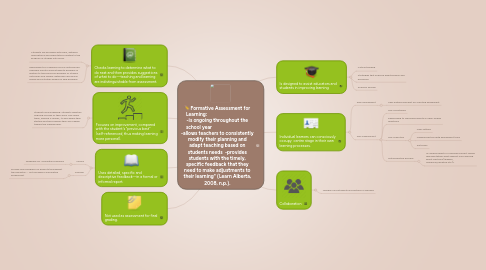Formative Assessment for Learning: -is ongoing throughout the school year -allows teachers to consistently modify their planning and adapt teaching based on students needs -provides students with the timely, specific feedback that they need to make adjustments to their learning" (Learn Alberta, 2008, n.p.).
by Jessica Gomes Fonseca


1. Checks learning to determine what to do next and then provides suggestions of what to do—teaching and learning are indistinguishable from assessment.
1.1. Students are provided with clear, detailed descriptions and expectations related to the program of studies outcomes.
1.2. Assessment for Learning occurs continuously. Teachers monitor each student’s progress in relation to the provincial program of studies outcomes and flexibly determine upcoming needs and activities based on said progress.
2. Focuses on improvement, compared with the student's “previous best” (self-referenced, thus making learning more personal).
2.1. Student record keeping: students maintain ongoing records of their work. This helps them, beyond a "grade," to see where they started and the progress they are making toward the learning goal.
3. Uses detailed, specific and descriptive feedback—in a formal or informal report.
3.1. Formal
3.1.1. Feedback for evaluation purposes
3.2. Informal
3.2.1. Provide mini feedback on projects throughout the semester -- not included in summative assessment
4. Not used as assessment for final grading.
5. Is designed to assist educators and students in improving learning.
5.1. Critical thinking
5.2. Strategies that improve effectiveness and efficiency
5.3. Problem solving
6. Individual learners can consciously occupy centre stage in their own learning processes.
6.1. Peer Assessment
6.1.1. Peer editing checklist for a writing assignment
6.2. Self-Assessment
6.2.1. Self-monitoring
6.2.2. Responding to learning prompts or open-ended questions
6.2.3. Self-reflection
6.2.3.1. Goal Setting
6.2.3.2. Guided practice with assessment tools
6.2.3.3. Portfolios
6.2.4. Metacognitive process
6.2.4.1. i.e. Responding to a Learning Prompt: Which representations best support your learning about fractions (graphic, numerical,narrative..etc.)?
